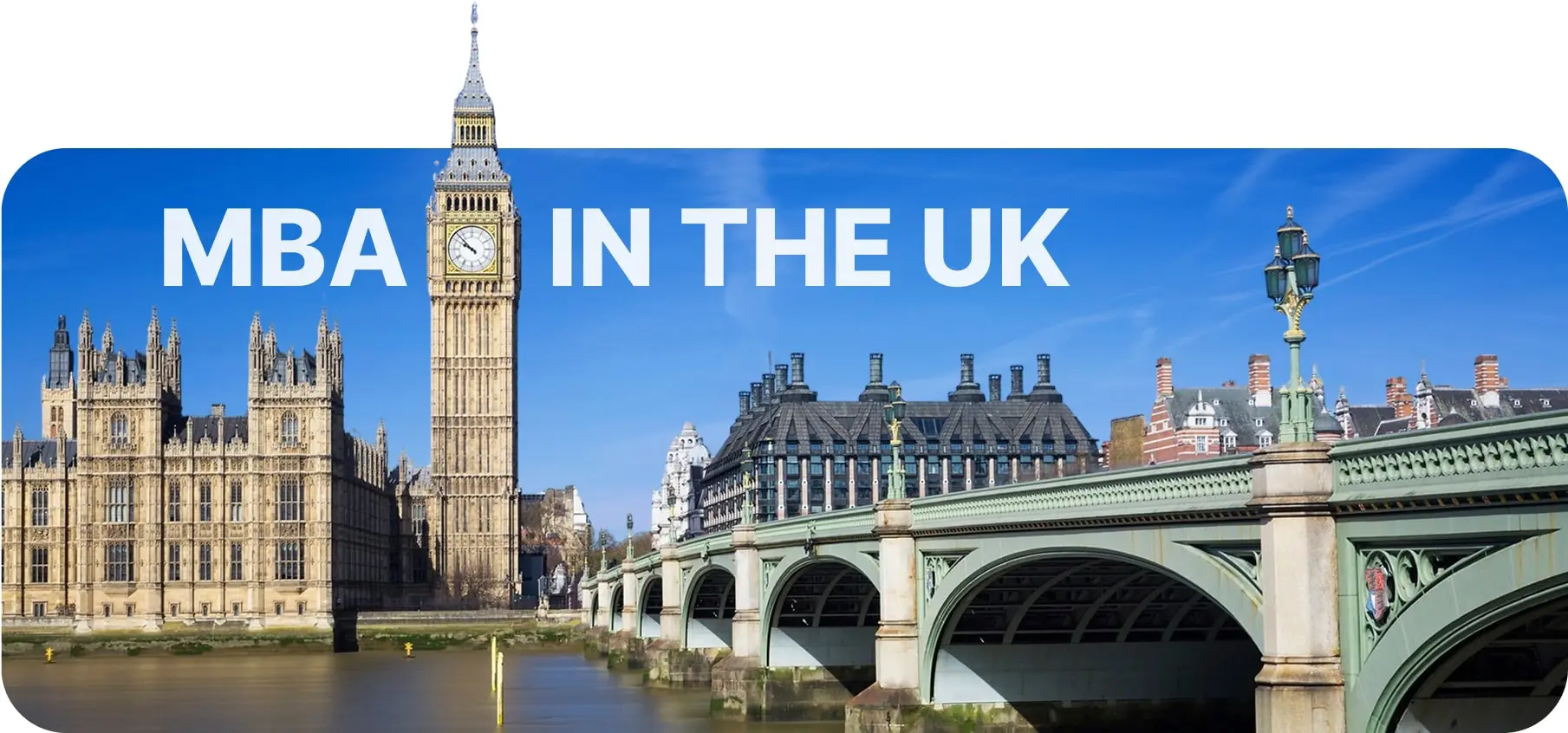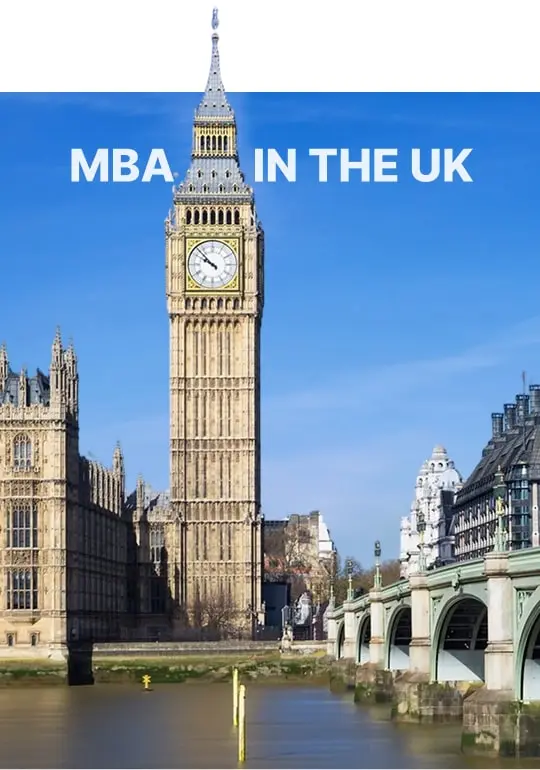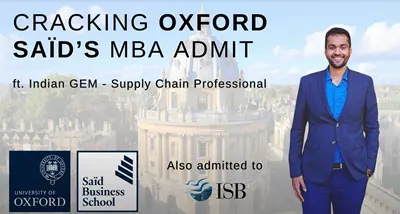

With 2000+ successful admits, MBA in UK remains a top choice for applicants of LilacBuds, a leading MBA admissions consultant. Renowned for its education system, inclusive culture, and job market, it’s ideal for launching your international career.
Top Universities
130+ Renowned Business Schools – Includes globally ranked institutions like London Business School, Oxford (Said), and Cambridge (Judge).
Flexible Programs & Degrees
Choose from Full-Time, Part-Time, Executive & Online MBA Options – Suited for early-career to senior professionals.
Average Expenses
Annual Tuition Fees range from £20,000 to £65,000 – Varies by university, duration & specialization.
Career Ready Experience
90%+ MBA Graduates Secure Internships or Jobs Within 6 Months of Graduation.
Visa & PR Opportunities
2-Year Post-Study Work Visa (Graduate Route) – PR Pathways Available via Skilled Worker Visa.
Strong Job Market
Average Base Salary Post-MBA Ranges from £55,000 to £100,000 – Higher for top-tier graduates.
The United Kingdom is one of the top destinations for international students, offering a rich academic heritage, globally recognized universities, and a fast-track route to a successful career. Home to some of the top MBA programs in UK, it is known for its high academic standards, multicultural society, and strong industry connections. Studying in the UK provides MBA students with the skills and experience needed to thrive in a global business environment.
Top Ranked Universities and Quality Education
The UK is home to prestigious institutions like Oxford, Cambridge, and London Business School. Renowned for academic excellence and rigorous teaching standards, UK universities consistently rank among the best in the world for business and management education.
Unmatched Research Opportunities
UK business schools lead in research across finance, management, and innovation. With strong industry ties and access to global research networks, MBA students engage in real-world problem solving and cutting-edge business research.
Flexible and Diverse Programs
UK MBA programs are designed with flexibility in mind, offering one-year accelerated options, a wide range of electives, and customizable modules. This allows students to tailor their learning to specific career goals and areas of interest.
Career-Boosting Internships and Networks
Many MBA programs include internships, consultancy projects, and networking events with top companies. With strong ties to global employers, UK universities offer excellent opportunities for hands-on experience and post-graduation employment.
Rich Cultural Exposure and Diversity
The UK welcomes students from over 180 countries, creating an inclusive and globally minded environment. MBA students benefit from diverse perspectives, which enhance learning and prepare them for leadership roles in international markets.
Vibrant Student Life
With a lively student culture, world-class cities like London, Manchester, and Edinburgh, and countless student organizations, the UK offers a well-rounded experience. Students enjoy a balanced lifestyle that combines academic focus with personal growth and cultural exploration.
Our Program Recommendation Engine helps you discover the best-fit MBA programs across top UK universities and categorizes them into Dream / Reach / Safe options based on your academic and professional profile. TRY THIS NOW – and explore MBA programs in the UK that match your career goals and financial plans, and get one step closer to your goal to study MBA in UK.
The application process for U.K. universities involves several critical steps, from gathering required documents to securing a student visa. Follow this guide to ensure that your journey towards studying in the U.K. is seamless and successful.
Prepare academic transcripts, GMAT/GRE scores, English proficiency scores (IELTS/TOEFL), CV, SOP, and letters of recommendation.
Complete the university’s online MBA application form and upload all required documents before the deadline.
Application fees for MBA programs typically range from £50 – £150 depending on the university.
If selected, you will receive a conditional or unconditional offer letter from the UK business school.
Apply for the UK Student Visa (Tier 4) with your CAS, SOP, and financial proof to begin your MBA journey.
To apply successfully to MBA programs in the UK, it's important to be aware of the specific admission criteria. Understanding the MBA requirements in UK is essential, as they typically include academic qualifications, test scores, and professional experience.
Minimum GPA and Academic Eligibility
A bachelor’s degree with at least a 2:1 UK equivalent (around 60–70%) is typically required for admission.
TOEFL/IELTS Requirements
International applicants must meet English proficiency standards—IELTS 6.5–7.0 or TOEFL iBT 90–100 is commonly accepted.
Work Experience Requirements
Most MBA programs require 2–5 years of full-time work experience, preferably in managerial or leadership roles.
GMAT/GRE Expectations and Waivers
Some UK universities require GMAT scores (typically 600+), though many offer waivers based on academic or work credentials.
Required Application Documents
You’ll need a resume, academic transcripts, SOP, LORs, test scores, and proof of English proficiency for your application.
Use our Document Draft Creator to easily craft impactful SOPs, LORs, and MBA application essays—tailored to your profile and goals in just minutes!
Explore the academic vibrance of the United Kingdom by choosing from some of its top student cities. Each city offers unique cultural experiences, world-class universities, and abundant career opportunities for international students studying in the UK.
London is the UK’s financial and business capital, home to globally recognized MBA programs, a thriving job market, and an unmatched cultural scene.
Known for its vibrant student life and strong industry ties, Manchester offers a dynamic environment for MBA students focused on innovation and enterprise.
Scotland’s capital blends tradition and innovation, offering high-quality MBA programs and a scenic, historic backdrop ideal for academic focus.
As one of the UK’s largest cities, Birmingham offers affordability, career opportunities, and excellent business education for MBA aspirants.
A hub of innovation and education, Glasgow is ideal for students seeking strong business networks and a rich cultural experience in Scotland.
London is the UK’s financial and business capital, home to globally recognized MBA programs, a thriving job market, and an unmatched cultural scene.
Known for its vibrant student life and strong industry ties, Manchester offers a dynamic environment for MBA students focused on innovation and enterprise.
Scotland’s capital blends tradition and innovation, offering high-quality MBA programs and a scenic, historic backdrop ideal for academic focus.
As one of the UK’s largest cities, Birmingham offers affordability, career opportunities, and excellent business education for MBA aspirants.
A hub of innovation and education, Glasgow is ideal for students seeking strong business networks and a rich cultural experience in Scotland.
Find the perfect MBA program aligned with your career goals. Get insights on leading universities, course structures, tuition fees, and more to plan your next move.
Tuition Fee
The tuition fees for studying in the UK vary significantly depending on the university, program, and whether the institution is public or private. On average, tuition can range from £31,000 to £115,000 for the entire program. Here’s a detailed breakdown of the fees for public and private universities in the UK:
Public Universities
Generally more affordable than private universities, with fees typically ranging from £31,000 to £61,500 per year.
Private Universities
Tend to be more expensive, with fees ranging from £61,500 to £115,000 per year.
Student accommodation can range from £7,920 to £15,192 annually, depending on your living arrangements while studying in the UK. The major components of living expenses include:
Rent (on-campus or off-campus)
Utilities (electricity, water, gas, internet)
Food (groceries, dining out)
Travel (to and from your home country)
Other costs (books, transport, personal)
Other monthly expenses can include:
Take-out food
Travel and vacation
Car rental/insurance (if applicable)
Entertainment/TV
Other costs (books, transport, personal)
A wide range of scholarships are available to support international students pursuing an MBA in the United Kingdom. These scholarships can significantly reduce tuition fees and help cover living expenses throughout the program.
Awarded to students with outstanding academic or professional achievements.
Designed for students who demonstrate financial need alongside strong potential.
Funded by external organizations, governments, or international agencies.
Granted by top university leadership to recognize exceptional candidates.
Encourage students from underrepresented backgrounds or diverse regions.
For applicants with a strong entrepreneurial background or business ventures.
Sponsored by companies or in partnership with business schools.
Additional options not tied to specific categories but still widely available.
What are the entry requirements for an MBA in the UK?
Most UK universities require a bachelor’s degree (or equivalent), a competitive GMAT or GRE score, and 2–5 years of work experience. Some schools may waive GMAT for candidates with strong professional backgrounds.
Is work experience mandatory to apply for an MBA in the UK?
Yes, most MBA programs in the UK expect applicants to have at least 2–3 years of professional experience. Executive MBA programs may require even more—typically 5–10 years.
Can international students work while pursuing an MBA in the UK?
Yes, international students on a Tier 4 (Student) visa are usually allowed to work up to 20 hours per week during term time and full-time during holidays.
Explore flexible work options and gain valuable industry experience while studying abroad in the UK. From on-campus roles to internships, find opportunities that enhance your academic journey and career prospects.
Flexible Work Options
Students with a UK Student visa can work part-time (up to 20 hours per week) during academic terms and full-time during breaks, with opportunities available both on- and off-campus.
Post-Study Work Opportunities
MBA graduates may qualify for the UK’s Graduate Route, which allows them to work or look for work in the UK for up to 2 years after graduation in roles aligned with their career goals.
Navigating the UK visa process is a critical step in your study-abroad journey. Here's everything you need to know to get started with studying in the UK. Also, read our blog, "How to Reapply for a UK Student Visa After Rejection," makes it easier to understand
Types of Visas
Student Visa (formerly Tier 4)
This is the primary visa for full-time students, including MBA candidates. It allows you to study in the UK and work part-time during term time.
Cost: £490
Graduate Visa
Available to international students who have completed a degree in the UK. It permits you to stay and work, or look for work, at any skill level for up to two years after completing your MBA.
Cost: £715
High Potential Individual (HPI) Visa
For graduates from top global universities (non-UK) within the last five years. No job offer is required to apply.
Cost: £715
Requirements
To apply for a UK student visa, you'll need to gather the following documents:
Visa Application Process
Follow these key steps to apply for your U.K. student visa:
Visa Denials & Rejections
While the UK has a high acceptance rate for student visas, denials can happen. Common reasons include:
Let Us Guide You Through the Process!
Get expert insights and personalized support to make your U.K. MBA visa journey smooth.
Here are some quick facts and stats about pursuing an MBA in the U.K.
Over 150,000 international students pursue postgraduate degrees, including MBAs, in the UK each year.
The UK is home to 3 of the top 10 global MBA programs, including London Business School and Oxford (Said).
The UK is a global business hub, hosting offices of major firms like McKinsey, Amazon, HSBC, and Deloitte.
MBA graduates in the U.K. earn average starting salaries of £50,000–£100,000 per year.
The Graduate Route visa allows MBA graduates to stay and work in the UK for up to 2 years after completion.
MBA students in the UK can work part-time (20 hrs/week) during term and full-time during academic breaks.
Student life in the U.K. is diverse, with a strong emphasis on academics, personal growth, and social activities. Universities offer robust support networks to help international students settle into both their academic and social environments, ensuring a smooth transition to studying in the UK.
Work-Study Balance
International students can work up to 20 hours a week during the school term and full-time during breaks. MBA students often take advantage of this flexibility to gain practical experience, build networks, and supplement their income while managing a demanding academic schedule.
Accommodation Options
Students can choose from university dormitories, off-campus rentals, or shared apartments. MBA students frequently prefer private accommodations or studio apartments for greater independence, though some opt for shared housing to connect with fellow international students and reduce living expenses.
Cultural and Social Exposure
The UK is known for its multicultural environment, offering students a chance to participate in festivals, cultural events, and student clubs. Business schools host networking events, guest lectures, and case competitions that foster social interaction and professional development.
Student Blogs & Vlogs
Many U.K. students share their experiences through blogs and vlogs, giving future students insights into daily life, cultural norms, budgeting tips, and the academic expectations of UK universities. MBA-specific content often includes internship advice, career planning, and balancing study with networking.

Securing an MBA admit to Cranfield & UK Russell Group Programs

Cracking That Dream MBA Abroad | Getting into Oxford & ISB | Timelines, CV, Essays and more

How Lilacbuds helped Kajal achieve her MBA admits to UK and NZ B-schools